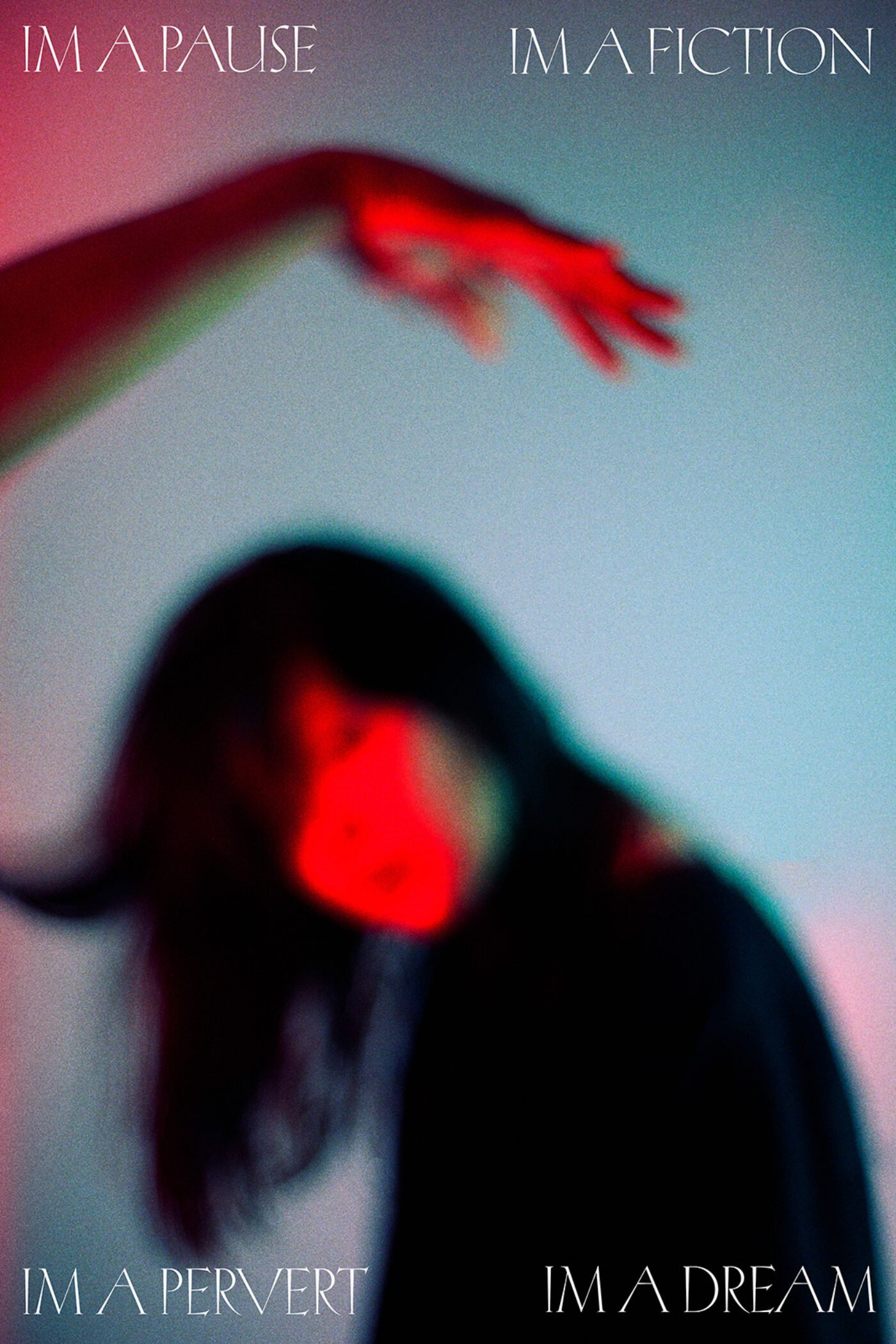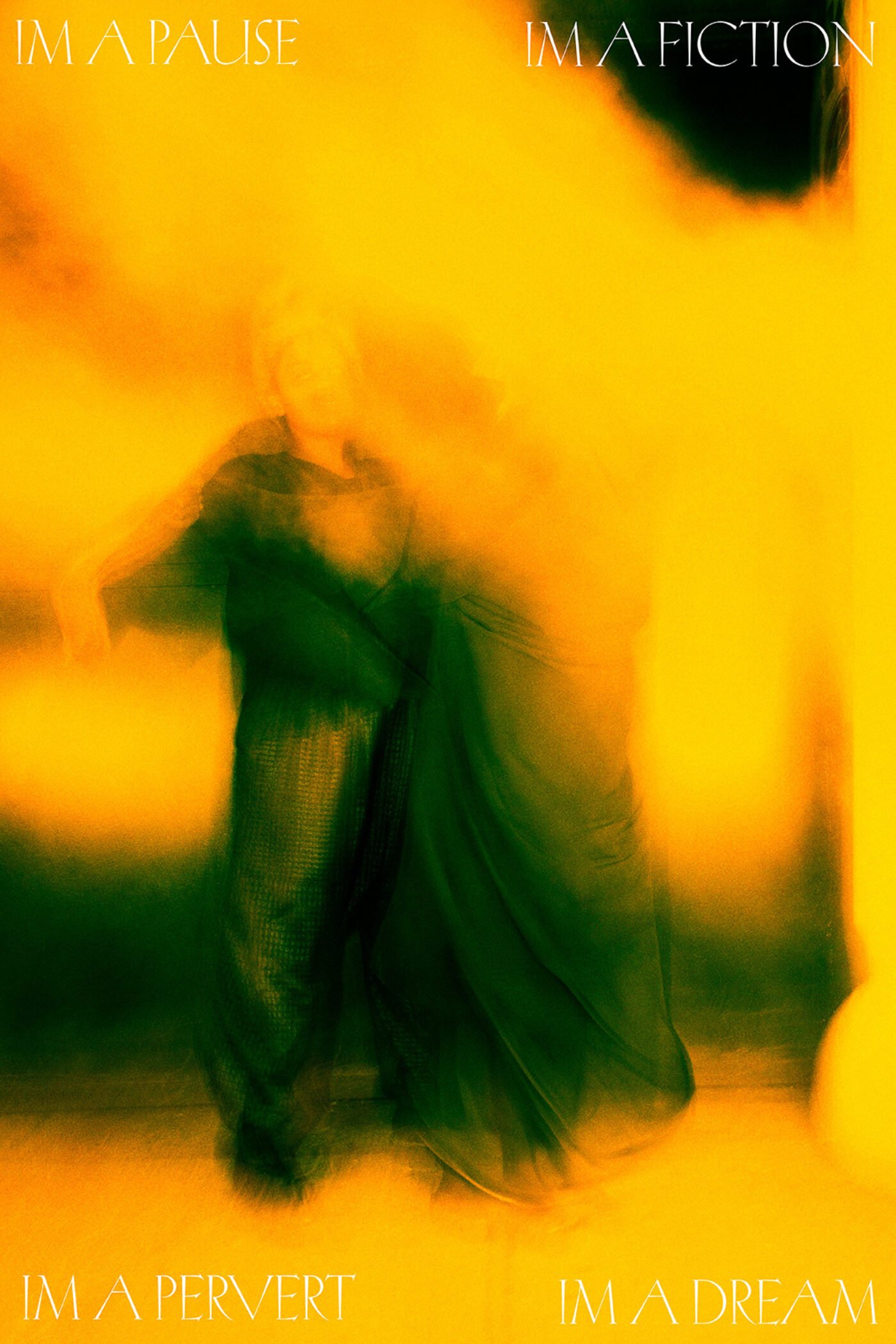Cassie Packard interviews Barnett Cohen, where he discusses memes, editing, and Ashbery for his Performance im a pause im a fiction im a pervert im a dream in this BOMB magazine article from November 1, 2023.
In Barnett Cohen’s performances, stuttering gestures and jittery verbal scores loop until they break, falling apart in front of us. Eschewing digital dualism, disciplinary siloes, or platform hierarchies, the South Africa–born, New York–based artist trawls a world of uneven content—Doja Cat dance-challenge TikToks, writings on data capitalism by McKenzie Wark, a Democracy Now episode on climate injustice, @somatic_based_content_only memes—for pieces of language and movement. These found fragments resurface in performances marked by a distinctly contemporary flavor and, for all the uninflected delivery of lines, a frenetic pitch.
For Performa Biennial 2023, Cohen is presenting im a pause im a fiction im a pervert im a dream, a two-person piece at Canal Projects with a set inspired by hospital waiting rooms and refrigerators. Over the course of the performance, monologues and asides on subjects including climate grief, surveillance anxiety, and the memeification of interiority disintegrate into static and echoes, paired with a minimalist choreography of jerky, isolated, and de- and recontextualized movements.
I first met Cohen last year when I was a studio visitor at the New York Art Residency and Studios Foundation, where he was in residence; I gave him my duplicate copy of Lucy Ives’s The Hermit, and we haven’t stopped talking since. For this conversation, Cohen and I met at a small Italian restaurant in Brooklyn. Upon returning home, I ran our hours-long dialogue through a cheap transcription service and was tickled by its misinterpretation of the title of a Judson Dance Theater piece. (I see connections between Cohen’s choreographies of contemporary life—namely, the interminable thumb-swiping—and the quotidian movements explored by Judson.) I texted Cohen the mistranscription. A few days later, he sent me a PDF; it has become a poem.
—Cassie Packard
Cassie PackardI was struck by the wonderfully percussive title of your upcoming performance, im a pause im a fiction im a pervert im a dream. What’s the origin story there?
Barnett CohenTitles kind of find me. I saw a meme that started with “I’m a ghost” and proceeded to follow the format “I’m a blank / I’m a blank / I’m a blank.” I thought it had so much punch to it. I only subsequently realized it comes from an Alanis Morissette song. I love the four-part structure of it. I love the contemporary randomness of its origins.
CPIt also made me think of that Arthur Rimbaud line, “I is another.”
BCI’m actually reading his collected poems right now. My writing and performances revolve around the idea that the self is multiple. There’s the performance of us and the backstage us. Within these superstructures, there’s the self that occurs over, say, the course of a meal at a restaurant or while taking the subway to said meal: all these layered identities that exist as we move through space and time. That multiplicity makes a fixed or static identity fairly unreal. “You” might easily be a fiction to yourself or a myth to others.
Barnett Cohen, im a pause im a fiction im a pervert im a dream, 2023, as part of Performa 2023 at Canal Projects. Performers Deja Bowen and Ray (Tsung-Jui) Tsou; sound design by Victoria Keddie; lighting design by Sarai Frazier; looks by APOTTS with styling by JenniLee. Courtesy of Andrew Hallinan.
CPIn keeping with the title, which makes meaning out of repetition, your performances are often characterized by words and movements that repeat to the point of glitching. I’m curious about how this creative strategy nudges viewers toward meaning, particularly in light of your work’s eschewal of a clear narrative arc.
BCI believe that everything worthwhile is done with others. I have prison abolitionist Mariame Kaba to thank for that wisdom. So, for me, meaning is not made in the singular. I’m more interested in the space of encounter between maker and viewer or reader—that place where intention meets experience. I suppose I don’t believe in meaning as a tool for comprehension. Something that’s often communicated to me is that my performances end up in people’s dreams, which is a meeting place too. Much to my frustration, whenever I’m working on a new performance, whatever we are rehearsing winds up in my dreams. I encounter myself again, and again, and again to the point of insomnia.
Regarding the incoherence that you’re alluding to, I think that in a sense I construct my pieces to deconstruct ideology; when you experience narrative, you’re ultimately experiencing ideology. Something I invariably return to in my writing is the narrative citizens of the United States are fed about the US: that this nation is chrome, and it’s sexy, and it’s freedom, and it’s flags, and it’s fireworks, and it has a functioning—or semi-functioning—infrastructure. But when you look under the hood, it’s just a bunch of maggots. As a queer person and a political activist—I work with people in immigration detention centers across the country—my perspective is not a theoretical proposition; it’s experienced. That experience contextualizes my writing, imbues it with urgency and velocity.
Barnett Cohen, ROTTTTTTTTT, 2023, presented at Rupert (Vilnius, Lithuania) as part of the Earth Bonds Symposium. Performers Kristina Morta Paškevičiūtė, Jevgenijus Kovalčukas, and Adelė Šuminskaitė; curator Tautvydas Urbelis; looks by Marija Petraitytė; styling by Elena Marija Veleckaitė. Photo by Silvestras Polinauskas. Courtesy of the artist.
CPYes, your texts are more like fusillades of feeling than stories. They’re also closer to collages, as you stitch together pieces of text from various sources—drawing on, for example, a book of poems or a conversation with a friend. Can you tell me a bit about your writing process?
BCAs a student, I started making these associative lists when I was in my studio: lists of internal experiences, of where and how my thoughts moved. When I started making performances in Los Angeles, I initially wanted to create a piece in the mind of the audience. For example, when I say “car,” what you imagine is not what I imagine. There’s an entire ecosystem of imagery that emerges from memory. So that’s where it started, and over the years these lists have grown into something more like texts, though there’s no punctuation, and I write them in paragraphic chunks. When I make a performance, I break them up into what I would say is the most barely legible script possible. I consider the texts not as scripts but as scores. Much of my writing hybridizes my thinking with found language I accumulate from personal conversations and what I read, overhear, or encounter online. These are all footnoted in chapbooks of the piece I distribute at each performance. For me, footnotes and bibliographies are an extrapolation of thought into community.
CPHow does the construction of these scores relate to the construction of your choreographies?
BCDance is like the language of the internet; I always enjoy seeing live performance, but what I’m really into is what people are doing in their bedrooms and how that movement carries into the world. im a pause im a fiction im a pervert im a dream is heavily movement-oriented; with the performers, there’s a lot of “What about this? Let’s try that,” whether it’s pulling up TikTok or referencing Anne Teresa De Keersmaeker. The performers change the text too. For example, in a recent rehearsal, my longtime collaborator Deja Bowen misread “postmodern moves” as “postpartum moves.” Her slip made the phrase more emotionally resonant, and we changed the line. I might be the one writing the text and nudging it into the world, but I deeply believe in the power of collective idea generation and the individual energy and embodied histories that the performers bring to the work. From a language perspective, I’m also thrilled to work with artist Victoria Keddie on sound for the piece. She’s going to make the text sinewy and taffy-like as she processes the performers’ voices, taking what were initially clear and comprehensible sounds and distorting them until they become pure acoustic presence. For INFORMAL ECONOMIES, my piece at Judson Church in January, I’m working with six performers and attempting to slow my pace into stillness and silence.
Barnett Cohen, The Complaint Society, 2023, as part of the Exponential Festival at The Brick. Performers Deja Bowen, Rachel Rivera, Lena Engelstein, and Briana Archer; looks by APOTTS with styling by JenniLee; lighting design by Sarai Frazier; movement direction by Lena Engelstein; text design by Tanya Rubbak. Photo by Walter Wlodarczyk. Courtesy of the artist.
CPYou’ve mentioned memes, TikTok, and YouTube as sources. To what extent are you consciously engaging with the language of the internet or even endeavoring to access an internet unconscious? As I watched your 2023 performance The Complaint Society, I found its particular set of paradoxes—diffuse yet jam-packed, depersonalized yet intimate, lurching yet looping—to be oddly familiar. It occurred to me that the piece was tapping into this “very online” mode of thinking and existing that I personally have a lot of trepidations about but participate in.
BCI was taught that to be a writer you need to be highly educated and to know well a literary canon that is dominated by straight white men. That you need to be anxious in the Bloomian sense. That you need to write with the power of narrative at your desk. I tried to write in this way, and I utterly failed. My prose was an embarrassing pastiche of F. Scott Fitzgerald’s Tender Is the Night. I gravitate instead to the looseness of meme culture—that you can try something out, throw it away, version it ad nauseam. Memes are a love language, a real language, a kind of poetry. I’m fascinated by the ways that people use language when language is not regarded as precious, and that informs my practice as a writer. You know, the poet John Ashbery never edited any of his writing. He just wrote it and left it, taking the approach where he just went into his subconscious, pulled things up, and worked with what was there. There’s something to that.
As far as the internet goes, we should be terrified of panoptic systems of surveillance, which are first used experimentally on people at the borders of our national existence. But the internet has also been a place for people to find themselves; for communities, including the queer community, to gather; and for people to meet around language in a way that is not monumental. I think the idea of being precious is really object-oriented. You don’t want to break it! But that’s what you do with language: you break things; you break language itself.
Barnett Cohen’s im a pause im a fiction im a pervert im a dream runs from November 3 to 5, 2023, at Canal Projects in New York City as part of Performa Biennial 2023. INFORMAL ECONOMIES will take place on January 22, 2024, as part of Movement Research at Judson Church in New York City.
Cassie Packard is a Brooklyn-based art writer with bylines in publications including Artforum, ArtReview, The Brooklyn Rail, frieze, and Los Angeles Review of Books. She is the author of Art Rules (Frances Lincoln, 2023) and has contributed to a number of art books and catalogues.





